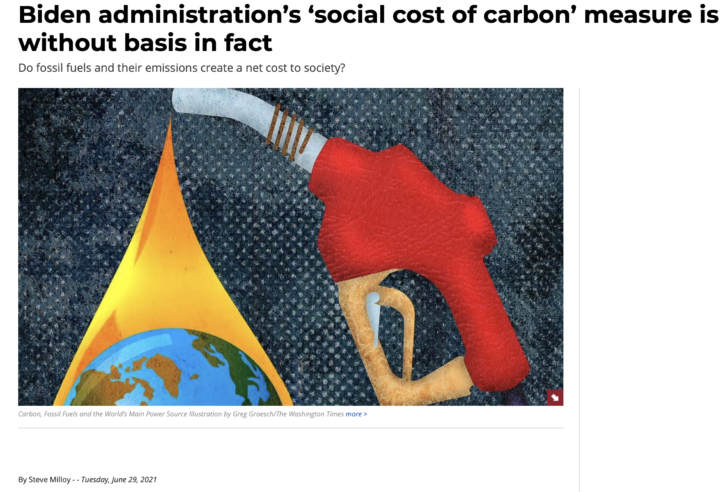My latest in the Washington Times (Web | PDF).
Please support JunkScience.com!

To advance its climate agenda, the Biden administration is seeking public comment on an effort to memory hole the realities of fossil fuels and drive punitive regulations by establishing a measure called the “social cost of carbon.”
The calculation of the social cost of carbon (SCC) was first ordered by a federal appeals court in 2008. Environmental activist groups and several blue states had sued the Bush administration for failing to consider any benefits of reducing CO2 emissions in setting more stringent fuel economy standards.
The Obama administration eagerly embraced the court order. In 2010, it set the SCC value at $31 per ton of carbon dioxide (CO2) emitted. This meant that every ton of emissions cost society $31 in unspecified and perhaps imaginary damages.
An overly-cautious Trump administration (think about that phrase) knocked the social cost of carbon figure down to between $1 and $6 per ton of CO2. Now the Biden EPA is looking to jack back up the social cost of carbon to economically justify climate regulations.
The academicians’ theoretical case for an SCC is to fine-tune markets with “optimal” adjustments of CO2 emissions. However, the Biden administration blew the cover on this sham exercise with its predetermined goal to cut emissions 50% by 2030 and 100% by 2050. The SCC is nothing but an after-the-fact fraud to justify their suicidal energy policy.
Is there an actual social cost of carbon? Do you need to be an economist to answer that question?
Regardless of one’s views on climate, we live in a world that is entirely dependent upon fossil fuels and their consequent emissions. From power generation to food production to transportation to buildings to whatever part of modern society you want to name, none of it exists without fossil fuels.
What about wind turbines, solar panels, electric vehicles, nuclear power plants and other “emissions free” or “low carbon” technologies?
Right now, none of those things can be manufactured, constructed, transported, installed, operated or maintained without fossil fuels. To erect a single wind turbine, for example, can require as much as 650 cubic yards of concrete and 45 tons of iron rebar — all produced and transported courtesy of fossil fuels.
Our total dependence on fossil fuels is not controversial. It is a reality that was even admitted by anti-fossil fuel Biden Interior Department Secretary Deb Haaland at her Senate confirmation hearing. Pressed on our ongoing reliance on fossil fuels by Sen. Bill Cassidy, Louisiana Republican, she could only offer this sheepish response: “We’re hoping that when we create some of these clean energy opportunities, perhaps that will change.”
We live in a world where essentially nothing happens without fossil fuels. As Greenpeace co-founder Patrick Moore often tells his Twitter followers: “[Without fossil fuels] billions would die of starvation.” If our society would collapse without fossil fuels, does a “social cost of carbon” really exist?
Let’s assume for the sake of argument that carbon dioxide emissions contribute to extreme weather here and there. What of it? Would any rational person really give up the daily benefits of fossil fuels in hopes that there will be fewer or less intense bad weather at some unknown place and time in the future? Of course, not.
There is no substitute technology for reliable fossil fuels. When Texas’ wind turbines froze last February tripping off crippling and deadly blackouts, the Biden administration didn’t send more wind turbines, solar panels or batteries; it sent diesel generators. When drought-stricken areas erupt in wildfire, fire-fighters use fossil fuel-based equipment and chemicals to bring the fires under control.
Human activity emits about 60 billion tons of CO2 per year. A social cost of carbon of say $40 per ton implies that if we stopped emitting CO2 for the next year, we would create $2.4 trillion in economic benefits. Is that really what would happen? Or would there just be total chaos, economic collapse and mass death?
Of course, people can live without fossil fuels. The pre-Industrial Revolution global population was about one billion. But we have added almost seven billion to that number. It is not possible to feed and shelter that amount of humanity, and to increase their standard of living without prodigious amounts of fossil fuels, currently amounting to about 8 billion tons of coal per year and 100 million barrels of oil per day.
One of the myriad problems with the climate controversy is that it rarely ever takes place in the context of reality. The notion that fossil fuels and their emissions create a net cost to society is without basis in fact. Possibly one day, new technologies will replace fossil fuels. But that day is not during the Biden administration or even on the horizon.
Steve Milloy publishes JunkScience.com and is the author of “Scare Pollution: Why and How to Fix the EPA.”
I love how science is thoroughly rewritten by the activist deep state. We know that the planet itself spits out more filth than all of mankind each year, but we push the arrogant belief that WE have the power to destroy the planet.
Then there’s this massive push for humanity to go meat free while starving the plants of carbon. Amazing, just utterly amazing.
All I hear about is cost, cost, cost. Basic economic analysis requires cost/BENEFIT numbers. These scam artists conveniently (for them) leave out the benefit(s) of carbon and hydrocarbons.
For one thing, I’ve read that the green areas of the Earth are some 20% larger than they were since the concentration went up to around 400ppm. Is that not a benefit? It means more oxygen creation, better growing conditions for agriculture and every other plant and animal.
Real World Experience (RWE) clearly indicates that except in the cyclical variation, the weather is no more dangerous that it was in decades past, so all this nonsense about stronger hurricanes and tornadoes is pure junk science.